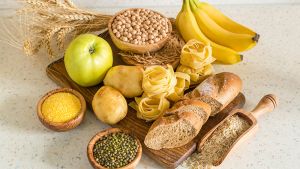Carbohydrates: Difference between revisions
Jump to navigation
Jump to search
Amwelladmin (talk | contribs) No edit summary |
Amwelladmin (talk | contribs) No edit summary |
||
| Line 1: | Line 1: | ||
{{a|carbs|{{carbs}}}} | {{a|carbs|{{carbs}}}} | ||
''(Pl. n)'' Any of a large group of organic compounds occurring including sugars, starch, and cellulose. They contain two parts hydrogen to | ''(Pl. n)'' Any of a large group of organic compounds occurring including sugars, starch, and cellulose. They contain two parts hydrogen to one part oxygen — like water! — and as foodstuffs they break down to release energy. | ||
Our favourite kinds of {{t|carbohydrates}} include [[rice]], [[pasta]] [[orzo]] - which is a [[pasta]] which identifies as [[rice]], and creates all kinds of ethcial issues at the [[carbohydrate Olympics]] — and of course dear old [[bread]]. | Our favourite kinds of {{t|carbohydrates}} include [[rice]], [[pasta]] [[orzo]] - which is a [[pasta]] which identifies as [[rice]], and creates all kinds of ethcial issues at the [[carbohydrate Olympics]] — and of course dear old [[bread]]. | ||
Latest revision as of 12:45, 17 September 2020
|
Carbohydrates Anatomy™

|
(Pl. n) Any of a large group of organic compounds occurring including sugars, starch, and cellulose. They contain two parts hydrogen to one part oxygen — like water! — and as foodstuffs they break down to release energy.
Our favourite kinds of carbohydrates include rice, pasta orzo - which is a pasta which identifies as rice, and creates all kinds of ethcial issues at the carbohydrate Olympics — and of course dear old bread.